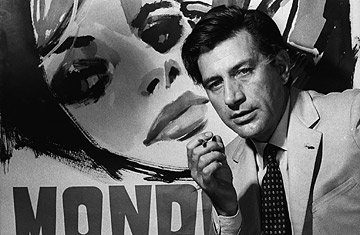
Gualtiero Jacopetti, film director of Mondo Cane, 1963
(2 of 3)
Mondo quickly became a 60s cult word, up there with Disco and Go-go, and its own film genre: the exploitation doc, or trashumentary. Russ Meyer's Mondo Topless (a Baedeker of San Francisco strip joints) and R.L. Frost's Mondo Bizarro and Mondo Freudo cashed in on the trend. Mondo Hollywood, Mondo Teeno, Mondo Mod — any word could be added to a title to clue audiences that they would see something bizarre and titillating. And in 1977 Saturday Night Live's proto-misanthrope Michael O'Donoghue parodied the original film with Mr. Mike's Mondo Video, in which the sepulchral host and his crew of "top Italian journalists" expose such oddities as an island cult that worships Hawaii Five-O star Jack Lord and a Parisian restaurant that serves rabbit poop — all scored to a "More"-like ballad (actually the surfer instrumental "Telstar" with new lyrics). Produced by Lorne Michaels, Mondo Video was intended as the pilot for a show that would fill SNL's slots during dark weeks. NBC went "Huh?" and the film slipped into the midnight-movie repertoire.
By expanding or lowering the standard for what people would watch, Mondo Cane indirectly spawned nearly everything lurid that followed it, from the Faces of Death and Shocking Asia fakeumentaries of the early VCR age to the exhibitionism of talk-show and reality TV. In The Godfathers of Mondo, critic Jeffrey Sconce points out how the Fox network in the 1990s plundered Jacopetti's style and tone with the Cops docu-series and such tabloid exposés as When God Pets Go Bad and Extreme Behavior Caught on Tape. And what is the Internet but a delivery device for all things Mondo?
Jacopetti and Prosperi made a couple of sequels to the biggest hit (the 1963 Women of the World and the 1964 Mondo Cane 2), but they had grander ambitions. Their salacious 1966 doc Africa Addio 1966) depicted in unforgiving detail the birth pangs of post-colonial Africa: the Mau Mau uprising, the Zanzibar revolution, the friction of blacks and whites in Kenya. This was guerrilla filmmaking at its most intense. In Dar al-Salaam, Tanzania, the crew was arrested, perhaps to be shot, when an officer arrived shouting, "Stop — they're not whites [i.e., English], they're Italians." (Prosperi recalls that as "a phrase that saved our life.") When Jacopetti was taken off to be interrogated or worse in the Congo city of Stanleyville, he turned to his cameraman and said, "Smile, smile," so they would show their captors no fear. "Gualtiero was a man of extraordinary charisma," Prosperi says. The man could bluff his way out of almost anything.
But not the accusation by critics that Africa Addio suggested that the civilized whites had left the continent to its savage natives. Roger Ebert, in one his first reviews as critic of the Chicago Sun Times, decried the "executions, decomposed bodies, burning flesh, suffering and death.that they are staged for our amusement, cloaked in the respectability of an 'impartial' documentary, and in the end that is the most disgusting thing about this wretched film." (Ebert was reviewing the American version, significantly shorter than the 2hr.19min. original, and with a different narration; but he probably wouldn't have liked the directors' cut either.) In The Godfathers of Mondo, Prosperi sighs that "The public was not ready for this kind of truth"; and Jacopetti argues that Africa Addio "was not a justification of colonialism, but a condemnation for leaving the continent in a miserable condition." Unfortunately for Africa, much of it is still in that condition.
After a newspaper column written by a friend of the filmmakers who had visited them on location and charged them with staging the execution of one prisoner, a murder charge, Jacopetti was tried for murder in an Italian court. The film's footage was seized; a police sign on the editing-room door reads "Confiscated due to massacre." Jacopetti and Prosperi produced documents showing that they had come on the scene just before the shooting, and Jacopetti was acquitted. Someone must have liked Africa Addio: it won the David di Donatello award (the Italian Oscars) for Best Production, tied with Pietro Germi's comedy Signore & signori and John Huston's The Bible.in the Beginning. The Minister of Education was supposed to present the prize to Jacopetti and Prosperi, but he refused.
